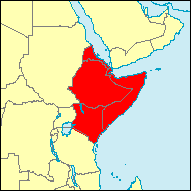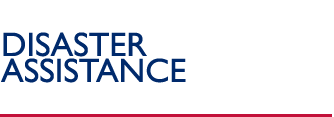Horn of Africa |
Disaster Assistance at a Glance
Recent Disaster Declaration:
Complex Emergency, Drought
OFDA Response:
Agriculture and food security, economy and market systems, emergency relief supplies, health, humanitarian coordination and information management, nutrition, protection, shelter and settlements, water, sanitation, and hygiene
Latest OFDA Report:
Horn of Africa Fact Sheet #8 (86kb
PDF)
|
 |
|
|
Most Recent Disaster Declarations:
Djibouti - Drought, 05-21-2008
Several seasons of failed rains have led to chronic drought conditions throughout Djibouti, primarily affecting pastoralists in rural areas. According to the Government of Djibouti (GODJ), an estimated 50 percent of livestock have died from lack of adequate water and pasture, negatively impacting pastoralist livelihoods and exacerbating deteriorating food security for an estimated 80,000 people. On April 17, the GODJ declared a humanitarian emergency in most areas of the country.
On May 21, U.S. Ambassador W. Stuart Symington issued a disaster declaration due to the effects of the drought. In response, USAID/OFDA is providing $500,000 to the U.N. Children’s Fund (UNICEF) to support an emergency response program for affected populations and provide therapeutic feeding for up to 25,000 acutely malnourished children.
Eritrea - Complex Emergency, 10-12-2007
Chronic drought conditions continue to negatively impact food security, health, and nutrition indicators, as well as water availability in Eritrea. According to the U.N. Office for the Coordination of Humanitarian Affairs (OCHA), only 32 percent of rural populations have access to protected water sources. Economic and political challenges, including a lack of human resources due to high levels of military conscription and shortages of agricultural inputs, have also contributed to the disruption of agricultural production and economic development, exacerbating existing poverty and deteriorating humanitarian conditions. In addition, political constraints prevent comprehensive assessments and monitoring and have led to a significant reduction in the number of humanitarian agencies operating in Eritrea.
On October 12, 2007, U.S. Chargé d’Affaires Jennifer A. McIntyre renewed the Eritrea disaster declaration in response to ongoing food and water insecurity. In FY 2007, USAID/OFDA provided nearly $3 million in humanitarian assistance for ongoing programming in the areas of health, nutrition, humanitarian coordination and information management, and water, sanitation and hygiene. A USAID/OFDA monitor, based in Asmara, will continue to coordinate relief activities and monitor general humanitarian conditions in Eritrea.
Ethiopia - Complex Emergency, 10-15-2007
Cyclical droughts, exacerbated by a rapidly growing population, endemic poverty, and limited government capacity, have led to chronic food insecurity and water shortages in Ethiopia. Despite an overall improvement in food security in 2007, approximately 8 million people in Ethiopia continue to receive food assistance through the productive safety net program (PSNP), and an additional 1 million people will likely require assistance in 2008. Significant humanitarian challenges, including flooding, conflict, malnutrition, acute watery diarrhea outbreaks, delayed food response, restrictions on trade and movement, and locust infestations, confront populations in many areas of the country. These challenges have also contributed to projected emergency needs for 2008.
On October 15, U.S. Ambassador Donald Y. Yamamoto reissued a disaster declaration in response to the ongoing complex emergency in Ethiopia. In FY 2007, USAID/OFDA provided more than $12.4 million to 15 implementing partners for humanitarian interventions in Ethiopia. In FY 2008, USAID/OFDA continues to support a wide range of relief programming, including in the health, nutrition, agriculture and food security, economy and market systems, logistics and relief commodities, humanitarian coordination and information management, risk reduction, and water, sanitation, and hygiene sectors.
Kenya - Complex Emergency, 01-03-2008
Incidents of violence and looting related to disputed presidential election results erupted across Kenya beginning December 30. As of January 2, the turmoil had displaced an estimated 100,000 people primarily in western areas, according to the Kenya Red Cross Society. Media reports indicate between 150 and 300 deaths and more than 1,000 injuries as a result of election-related violence.
On January 3, U.S. Ambassador Michael E. Ranneberger declared a disaster due to the effects of election-related violence. In response, USAID/OFDA is providing $200,000 through USAID/Kenya to the Kenya Red Cross Society for the purchase and distribution of emergency relief supplies, including blankets and shelter material, for communities displaced by the violence. USAID/OFDA staff in Kenya are monitoring the situation and coordinating with other U.S. and international agencies to facilitate humanitarian assistance to affected populations.
Somalia - Complex Emergency, 10-03-2007
Since 1991, widespread violence, endemic poverty, and recurrent droughts have generated a complex emergency in Somalia. Continued civil strife and inter-clan conflicts have complicated the humanitarian situation and limited access to affected areas. In FY 2007, following violence between the Somalia Transitional Federal Government (TFG) and militias associated with the Council of Islamic Courts (CIC), humanitarian conditions in Somalia further deteriorated. As a result, approximately 336,000 Somali refugees fled the country, and an estimated 725,000 people relocated to other areas within Somalia.
As of August 2007, more than 1.5 million Somalis continued to face a critical situation as a result of the cumulative effects of drought conditions, floods, and civil conflict, according to the U.N. Office for the Coordination of Humanitarian Affairs (OCHA). According to USAID’s Family Early Warning Systems Network (FEWS NET), normal to below-normal October to November deyr rains are forecast for southern and central Somalia and could lead to pre-famine conditions in 2008.
On October 3, 2007, U.S. Ambassador to Kenya Michael E. Ranneberger redeclared a disaster due to the ongoing complex emergency in Somalia. USAID/OFDA’s primary focus in Somalia is addressing the basic humanitarian needs of the most vulnerable populations through health, nutrition, water, sanitation, and hygiene activities. In addition, OFDA supports access to vulnerable populations for humanitarian staff through the United Nations Common Air Service (UNCAS). Since 1991, USAID/OFDA has provided more than $187 million for humanitarian assistance to Somalia.
For information on additional USAID disaster responses, please see OFDA Annual Reports.
Back to Top ^
|


